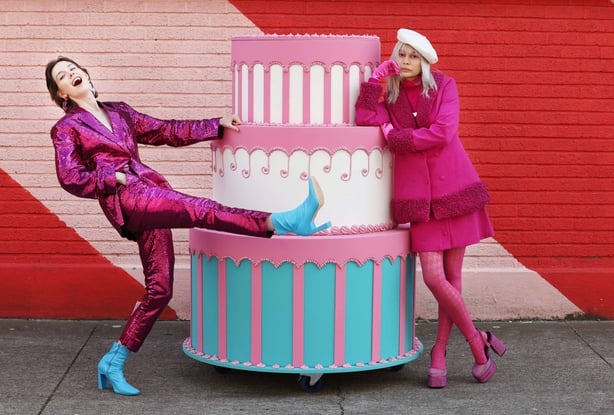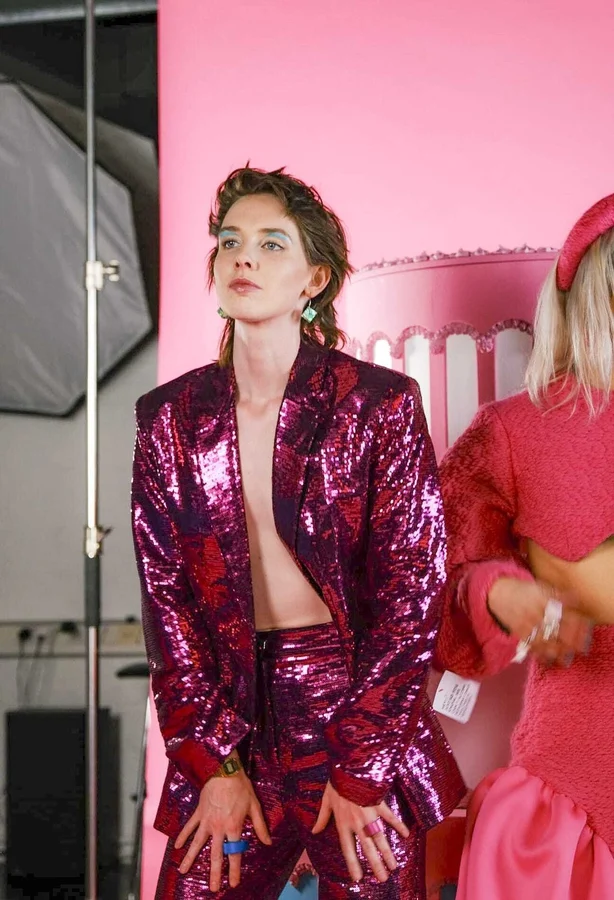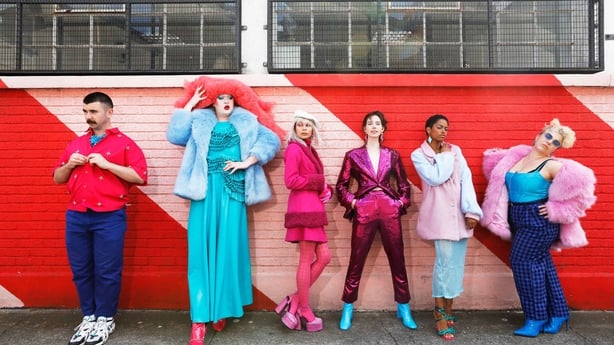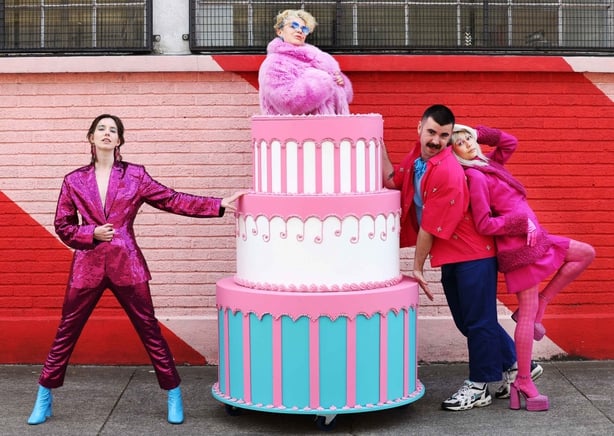The actor—who is also a comic, a playwright, and a trainee intimacy coordinator—likes to swim in the weird. Kate Demolder writes.
Wicklow multihyphenate Marty Breen first had the idea for BITCH - their Dublin Fringe tragicomedy which conjoins the notions of a drag cabaret, misogyny and morality - mid-way through a stand-up routine so filthy that the audience shirked all responsibility to collaborate.
"It was about three years ago," they say, oversized headphones framing their elfin features, short brown hair sticking out at their nape. "I needed to subvert expectations and make them laugh enough to trust me in order to deliver a gut punch. That intrigued me."
Little did anyone know, a gauntlet was laid that night––one that kickstarted a fascination for Breen with the parameters of performance.

Born in Newcastle, County Wicklow, Breen was the second child of four, to a doctor father and a book editor mother. As a child they wrote and performed, often alone in their room, choosing to nurture an innate need to prove something of themself.
As a teen, they often snuck out of school to take the two-hour bus to the Dublin Youth Theatre.
"It was the first place I kind of allowed myself to not feel stuck," Breen tells me. "I felt safe in it. Like, I’d hang out with the people I met there and they’d be doing party pieces, and I could do a nine-and-a-half-minute-long beat poem, and they’d like it."
After school, the creative returned to Dublin to attend The Lír National Academy of Dramatic Art, a drama school affiliated with Trinity College that offers conservatory training for theatre, film and television; a place they call "extraordinary, but incredibly intense".
The Lír has become known as a hub for young thespians in the city, a centre of excellence for actors looking to make it, really make it, like Éanna Hardwicke and Paul Mescal. Admissions are low and standards are high. ("Agents regularly schedule their calendar around the Lír’s end-of-year show," a casting agent once told me. "It’s widely known as the place from where the next big thing is going to emerge.")
"It felt like winning the lottery, just attending," them beam. "Being able to play for three years. Then when I graduated, I was able to observe Sue Mythen, the most incredible movement teacher, which led me down a path of intimacy coordination." (Breen is currently in training with Intimacy Professionals Association Class of 2024.)

"A lot of what got me interested in movement was kind of my own experiences," they say.
"I think we've come a long way, but I had some pretty avoidable experiences in rehearsal rooms and I think intimacy coordination is kind of the answer to that, and has been, certainly on sets. I think we all make our best work when we feel safe. It's that basic. And so when the onus is on protecting yourself, you’re sacrificing something.
"Especially as a young actor who doesn’t know their boundaries and is desperate to be chosen so they’ll say they’re fine with everything. Those boundaries are a lot about what BITCH, is about, the indecipherable lines of consent that are suddenly torn down with laughter.
"If someone says something defensive, and people don’t laugh––how does it change the play? And how do we, as an audience, react?"
Taking place in Bewley's Café Theatre, the 60-minute piece traces the line between male and female performances in a way that feels both difficult and correct to watch.
Breen uses her whole body to tell a story, pushing her eyebrows up and down, and moving her hands regularly to convey a feeling. They speak with a confessionality one might associate with smoking areas and sleepovers; beginning sentences brightly, and regularly pausing mid-way to choose the correct phrasing.
In those moments, we see them as they are: a creative who puts their whole being into everything.

Of late, Breen (who uses she/they pronouns) has developed something of a speciality for playing fresh-faced ingénues with complex, knotted histories.
Most recently, that work has been linked to a gender expression Breen herself has been duelling with, like when they starred as Jo March in Belfast’s Lyric Theatre production of Little Women.
"There was a review of the show that commented on a gender fluidity to Jo that they had never seen before," Breen says. "I loved reading that, but I also didn’t intend on it. That just happened to me when I was playing her, that was my version. But also, I had previously done a show at the Lyric where I’d played a teenage boy –– so it gets you thinking, is this a chicken and egg situation?"

BITCH pokes fun at similar parameters, playing with gender in a way that attempts to interrogate the audience’s already carved-out ideas of what it is to perform as a woman, man or someone outside of these boundaries.
In this way, there is an empowered femininity to Breen’s choices; not just the ways in which her characters are able to truly express themselves, but in the ways they can be backbiting and unlikeable, too.
For Breen, whose industry is anchored on the gender binary––awards are categorised into sections titled 'actors’ and ‘actresses’––that reaffirmation can rub like a blister, especially when it’s directed home. "I've been nominated for the Irish Times Theatre Award for Best Supporting Actress," they say. "Something I’ve had my own heebie-jeebies about as a more genderfluid person, hah."

As for how they wants their work to make us feel?
"Probably catharsis," they smile, before switching gears tonally. "I find it so interesting how and why we punch down, why we’re so much worse to each other than we are to a whole system, one that is making us hurt.
"And that’s because it’s easier to blame those in front of us rather than attempt to change the whole thing, but I suppose I wanted to shine a light on that system, one in which there are no solutions or bad guys or places to point your finger. At least, we don’t have any solutions unless we can look after each other."
Less than 12 hours after Breen and I spoke, they email me to further divulge––redirecting her thoughts into one, singular prognosis once more:
"We talk a lot about how everyone knows someone who has experienced the themes in this play, but not a lot about how, by that definition, we must all know people who have been perpetrators. Because it's hard to talk about. It doesn't mean you're a bad person if you love that somebody - it doesn't even mean they necessarily are. But it's the elephant in the room that I think means nothing is changing.
"We have to start having these conversations. This is the only way I know how to."
BITCH runs from 11-15 September as part of the Dublin Fringe Festival.
If you have been affected by issues raised in this story, please visit: www.rte.ie/helplines.
Disclaimer: The copyright of this article belongs to the original author. Reposting this article is solely for the purpose of information dissemination and does not constitute any investment advice. If there is any infringement, please contact us immediately. We will make corrections or deletions as necessary. Thank you.






